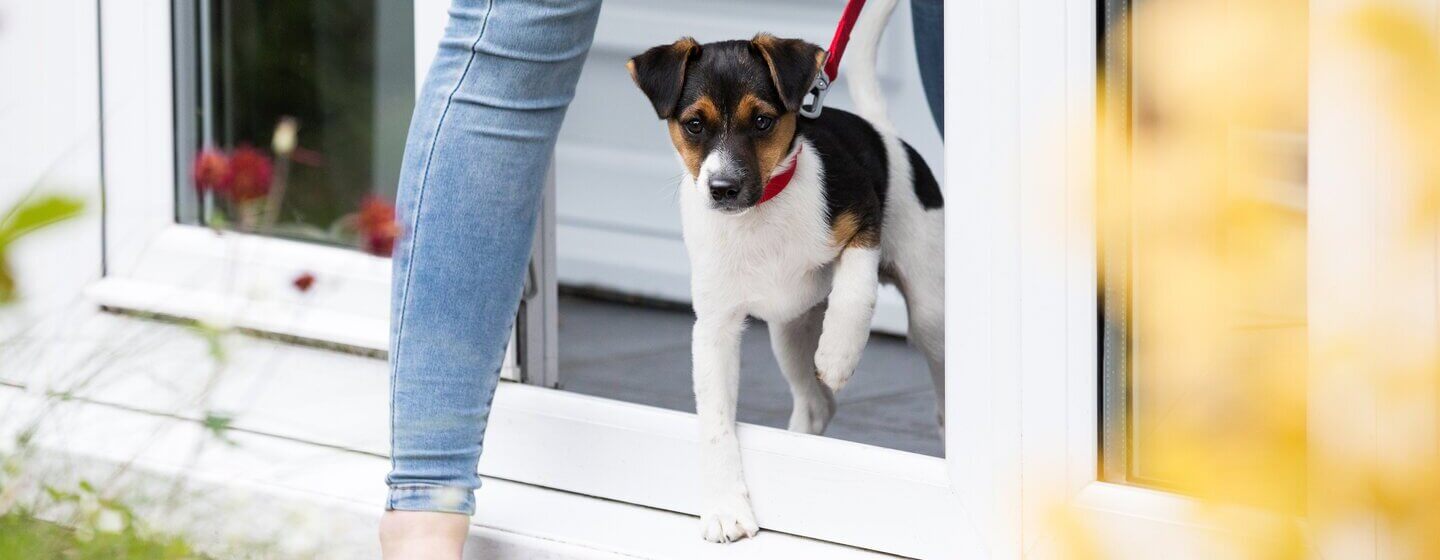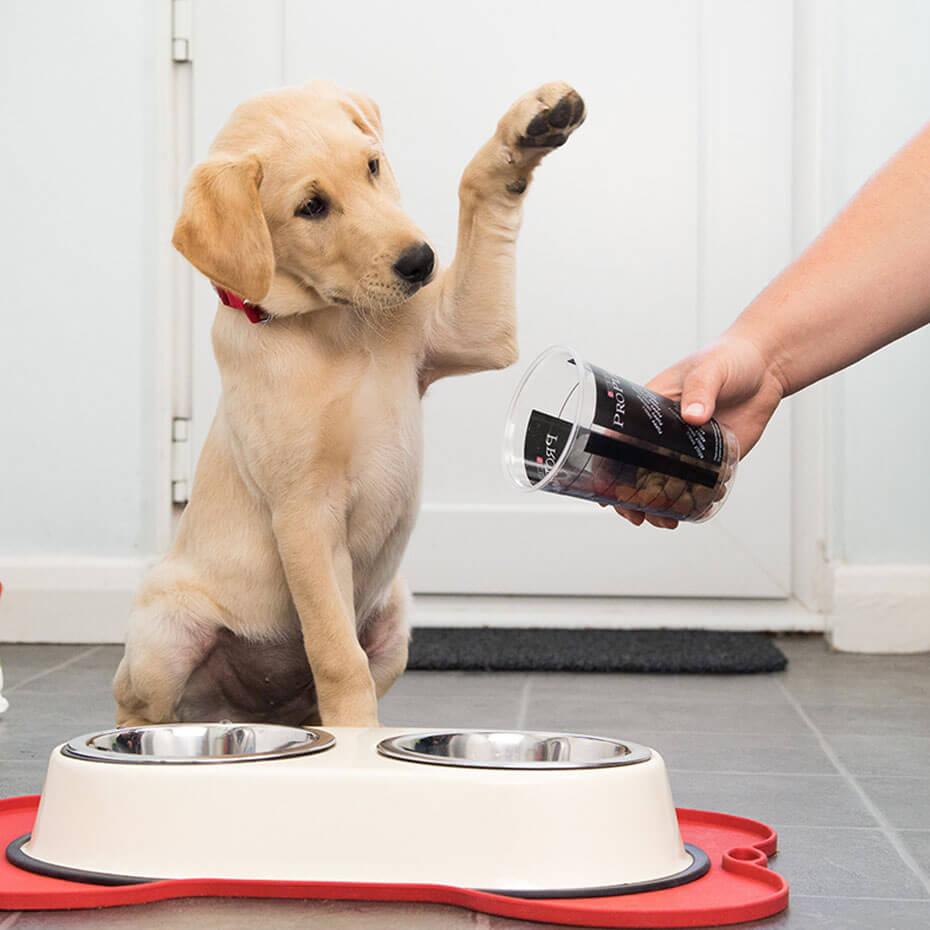
There are only certain times during the development of your puppy’s brain when you can help them become a friendly and outgoing companion. Too often people forget about helping them learn how to fit into our crazy lives.
Most people know about puppy socialisation but few understand what it really means, when to do it and how to do it properly.
However, with the state of the world on lockdown, there’s a new challenge in dog training. Despite the social distancing rules and exercise restrictions, we still want to ensure they are ready for the world.
What is puppy socialisation?
Puppy socialisation is a training process that helps puppies learn how to interact properly with humans, other dogs and other animals. It will also help them get used to being in a range of environments and scenarios. Puppy socialisation is one of the best tools we have, to prevent future behaviour problems in dogs.
Puppy socialisation in lockdown
Puppies between the ages of 3 – 14 weeks puppies are at a critical stage when they need to learn to be more at ease with the world around them. It means that we have be to creative for puppies under lockdown to ensure they are having as many opportunities as possible to experience new things.
How to introduce new things:
- Have patience.
- Use food to help build good associations.
- Never force them towards anything - always in their own time.
- Let them move away, back to you, for support if needed.
Good signs:
- Puppy looking at object calmly.
- Puppy choosing to go up and explore.
- Puppy choosing to disengage from new thing.
- Puppy able to be disengaged with food/toy/praise.
- Puppy able to play and interact normally after initial investigation.
- Puppy happy to interact.
- Soft, wiggly body language.
Help your puppy out if they're:
- Backing away.
- Barking.
- Crouched/still.
- Turning away/not facing it.
- Scared of approaching.
- Becoming fixated.
Keep reading for more information on the different stages in the socialisation period for puppies.
The first part in socializing your puppy involves introducing the dog to all you want them to have a social relationship with like people of all kinds and ages and other dogs, too.
Puppy socialisation is important because all animals are hardwired to be scared of new things. Nature gives newly born puppies a narrow window of development where things they are introduced to are part of life and nothing to be scared of. After this period, new things will be regarded with fear or suspicion.
The other bit is habituation. This teaches the puppy that there are things in their new life that might feel scary or distracting but are just stuff to ignore and not get worried about like fireworks, joggers, livestock, traffic, cyclists and so on.
Puppy socialisation and habituation is all about preventing these fears and creating a well-adjusted, happy, social dog.
In essence, socialisation means they can play with it, habituation means they can ignore it!
When to teach puppy socialisation and habituation
The tricky bit of puppy socialisation is that there are only certain times during the development of your puppy’s brain when these things can be learned. After that, the window of opportunity more or less closes. Your dog’s social skills and behavioural competencies become set in stone.
Additional learning can happen but when it comes to the way the dog reacts to the world around them – their personality – this is formed in those early weeks.
Puppy socialisation period begins when your dog becomes sentient at around 15 days old and ends at about 14 weeks old. During this time, they are learning who their social group is and who they feel safe and happy with.
The habituation part is far shorter – as all animals need to learn very quickly what is safe and what is dangerous if they want to survive. This starts at sentience and largely finishes at around 7 weeks old depending on the breed.
Things to avoid during puppy socialisation
There are many ways in which people can get puppy socialisation wrong, often forcing interactions or not giving puppies a choice to explore them in their own time.
Remember the puppy is making decisions about what is safe so all encounters have to be fun and positive. A scary encounter will be stored in your puppy’s brain as something to avoid or react to in the future when they are bigger and stronger.
The other way people get puppy socialisation wrong is to assume that it is normal for a dog to want to socialise with every other dog they meet. This is totally unrealistic and is one of the reasons why canine encounters can go wrong. A well-socialised dog is one who has some doggie friends they enjoy playing with, but can be around other dogs with a calm and relaxed manner while with their owners
Top tips on how to socialise your puppy:
- Be clear on what you are trying to achieve. Puppy socialisation is teaching your puppy that life is fun and safe. Make it all about treats and games – and rewarding experiences.
- Make a list of all the things your puppy’s new life is going to entail. Give your puppy a chance to experience these things in a safe and positive way on several different occasions.
- The aim of puppy socialisation is to teach the puppy that people, other dogs and different situations are safe and even fun. Don’t rush. Let them keep their distance and approach in their own time.
- Never force interactions and always give the puppy an escape route.
- Introduce your puppy to lots of different people in the house and outside, and also to other dogs you know are friendly. But remember the goal is to get them to be happy around other dogs, not to run off and play with every other dog they see!/li>
- Prevent noise sensitivities by using a sound app to play unexpected noises (sirens, thunderstorms etc.) at a low level while your dog is doing enjoyable things such as eating or playing.
- Join a good puppy class so they can learn to pay attention to you when there are other dogs around.
- Socialise with other owners and dogs you know your puppy likes and will play with. Friendly adult dogs are great teachers for young puppies.
- Continue your puppy socialisation until your dog is an adult. They will go through periods of confidence and other times when they seem unusually wary or fearful. Be sensitive to these times as they need your help to support them through these fear periods.
- Make puppy socialisation fun – for your dog and for you!




